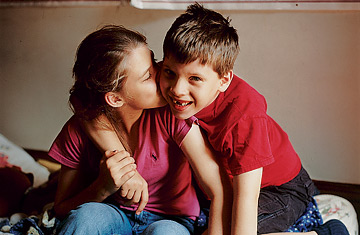
Twelve-year-old Tristan, who has autism, plays with his sister Zana.
A few months ago, I took my sons to buy shoes. Nate is 14 and autistic. Joey is 8 and "typical." And I'm the parent — most of the time. Before we got to the store, Joey said to me, "If Nate has a tantrum, I can handle him. You just focus on buying shoes. I'm better at handling tantrums than you. Sometimes you just yell and it makes things worse. No offense."
None taken. He's absolutely right.
The "typically developing" siblings of autistic children are, in fact, the furthest thing from typical. Often, they are wiser and more mature than their age would suggest. And they have to be, given the myriad challenges they face: parental responsibility; a feeling of isolation from the rest of their family; confusion, fear, anger and embarrassment about their autistic sibling. And on top of all of it, guilt for having these feelings. (See six tips for traveling with an autistic child.)
As their parents, there's a lot we can do to help. For starters, we can educate them early on, by explaining their sibling's disorder — a conversation that should be ongoing. Dr. Raun Melmed, co-founder and medical director of the Southwest Autism Research and Resource Center in Phoenix, suggests including non-autistic children in visits to the doctor or other autism professionals. Early intervention doesn't have to be "thought of as being geared only to the involved child," Melmed says. In his office, Melmed reassures siblings that "other brothers and sisters have negative and confusing thoughts about their [autistic] siblings. That is common." He also instructs parents to reaffirm that message at home. "Parents need only acknowledge to their healthy children that they know what they are going through and that negative feelings are normal," he says.
A great way for kids to feel "normal" is to meet other siblings of autistic children, which they can do at sibling workshops. At the Kennedy Krieger Institute for children with developmental disabilities in Baltimore, social worker Mary Snyder-Vogel runs a program called Sibshops. "The workshops give these kids the opportunity to realize they're not alone," Snyder-Vogel says. "[We play] a lot of games that help them interact and problem-solve with peers. Kids don't even realize they're getting support."
At a recent Sibfun workshop at the Jewish Community Center on Manhattan's Upper West Side, therapists used puppet shows to illustrate issues that are common among siblings of special-needs kids. When asked what they thought the puppets were feeling, the children in the audience needed no prompting, immediately shouting out words like sad, disappointed and jealous.
Siblings will commonly have negative feelings — some might never connect or want to connect with their autistic siblings — but the good news is that typical siblings often turn out to be more compassionate and caring than average. "These siblings have seen what it's like to have a hard time in life," says Sandra Harris, executive director of Rutgers University's Douglass Developmental Disabilities Center, a program for people with autism spectrum disorders and their families, and author of Siblings of Children with Autism: A Guide for Families (Woodbine House).
There are many other, more specific challenges that affect siblings of special-needs kids — and many of them apply to sibling relationships of every kind. Here are some of the issues that most frequently confront typical siblings — and their families — with advice from professionals.
